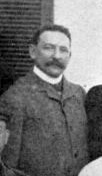Carl Neuberg
| Carl Neuberg | |
|---|---|
 |
|
| Born |
29 July 1877 Hanover, Germany |
| Died | 30 May 1956 (aged 78) New York City, United States |
| Fields | Biochemistry |
| Alma mater | University of Berlin |
Carl Alexander Neuberg (29 July 1877 – 30 May 1956) was an early pioneer in biochemistry, and he is often referred to as the "father of modern biochemistry". His notable contribution to science includes the discovery of the carboxylase and the elucidation of alcoholic fermentation which he showed to be a process of successive enzymatic steps, an understanding that became crucial as to how metabolic pathways would be investigated by later researchers.
Carl Sandel Neuberg was born on 29 July 1877 to a Jewish family in Hanover as the first child of Julius and Alma Neuberg. He was educated in the classical language gymnasium Lyceum I of the Ratsgymnasium until he was 15. In 1892 he moved with his parents to Berlin where he attended Friedrich-Werdersches Gymnasium. After graduating school in 1896, he studied astronomy, but soon switched to chemistry to comply with his father's wishes for him to become a master of brewery. He studied at the University of Würzburg and University of Berlin as well as Technischen Hochschule Charlottenburg.
On 21 May 1907, Neuberg married Franziska Helene (Hela) Lewinski, with whom he had two daughters, Irene Stephanie in 1908 and Marianne in 1911. His wife died from leukemia on 24 March 1929 at the age of 45. Neuberg was forced out of his job in 1934 under pressure from the Nazis. Just before the outbreak of the Second World War, he left Germany to work for a while at the University of Amsterdam, then travelled to Palestine via France during the war, eventually leaving in 1940 to move to the United States to join his daughters who had already settled there. He died on 30 May 1956 in New York after a prolonged illness.
Neuberg began his professional career working as an assistant in the physiological chemistry department of Charité in 1898 while he was still working on his doctoral thesis. He gained his PhD in 1900 working on the chemistry of glyceraldehyde under the supervision of Alfred Wohl at the University of Berlin. In 1903, Neuberg became a privatdozent, and in 1906 a professor at the University of Berlin.
...
Wikipedia
